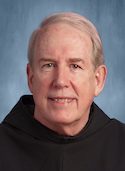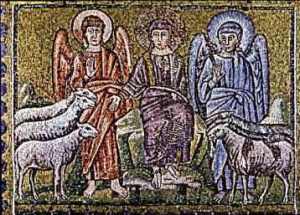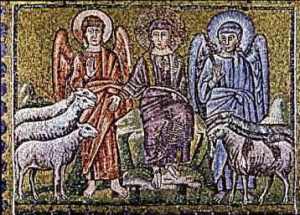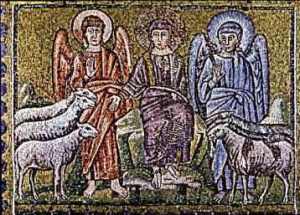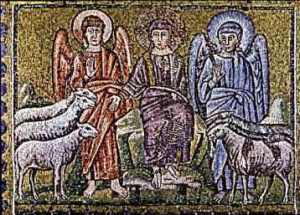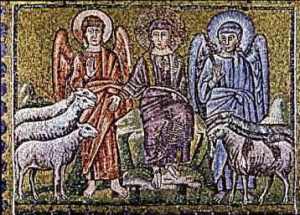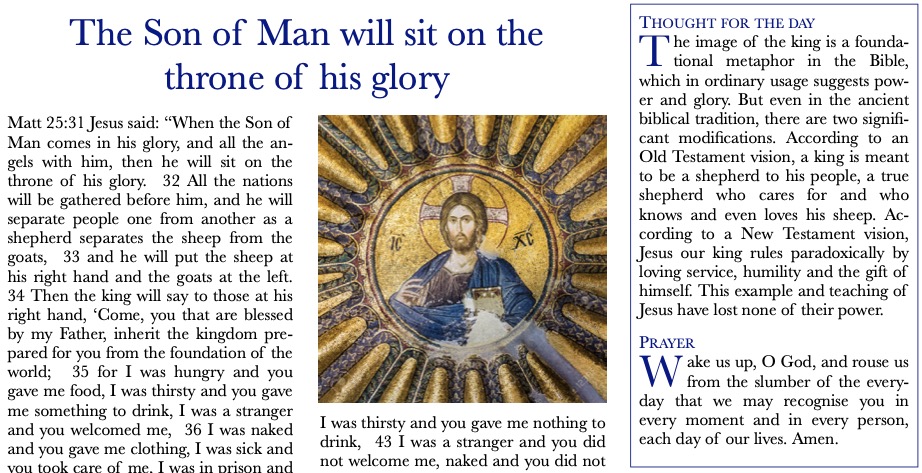Brant
Pitre
Topical
Studies
Topical Studies
Addiction & Recovery | Theology of the Body | Catechism Themes | Climate & Environment | Conflict & Peace | Justice | Pro-Life | Theology of Work

Life Recovery

Ezekiel 34:11-16 Even though Israel was now a conquered nation and Jerusalem had fallen, even though the people had been deported and had no real hope for the future—God had given them a promise that could be counted on: He would rescue them and bring them safely home again. No matter what our circumstances, we can be assured of God’s constant care and concern for us.
Matthew 25:31-46 Ultimately we will all be accountable to God on judgment day. We will be responsible not only for our own recovery but also for how we have helped others. The last step in recovery is to tell others about our recovery and encourage them in the recovery process. Since Jesus identifies himself with those who suffer, we should follow his example and be especially alert to the needs of others.
SOURCE: The Life Recovery Bible, Stephen Arterburn, David Stoop
RELATED CONTENT:
Ezekiel 34:11-16 portrays God’s deep concern for His people who have strayed from His path due to their own vices or addictions. The passage highlights God’s commitment to seeking out those who are lost or trapped in destructive cycles. It reminds us that even in our darkest moments of addiction, there is always hope for redemption.
Matthew 25:31-46 challenges believers to extend compassion towards others by addressing their physical needs during times of struggle. This parable encourages us to recognize that addiction is not just an individual battle but a societal issue that requires collective support. By reaching out with empathy instead of judgment or stigma towards those struggling with addiction, we can create an environment conducive to healing.
Theology of the Body

Mt 25:31-46 Pope Benedict XVI reminds us, “The king is Jesus; in him God entered humanity and espoused it to himself.” Yes, Jesus is King and Lord, but as such, he is Bridegroom. As St. John Paul II tells us, “In this manner, the absolute of lordship turns out to be the absolute of love.” As the Bridegroom-King, Christ reigns by serving, not by being served. And he wants us to reign in the same way. As we learn in the gospel, this is how the King will judge us: only those who loved as he loved will “inherit the kingdom.”
SOURCE: Christopher West
RELATED CONTENT:
The Parable of the Sheep and the Goats found in Matthew 25:31-46 is a powerful message from Jesus that provides profound insights into the nature of humanity and our relationship with God. This parable beautifully aligns with the Theology of the Body, a philosophical framework developed by Pope John Paul II that highlights the sacredness and dignity of the human body. By exploring this parable in light of the Theology of the Body, we can gain a deeper understanding of our call to love and serve others.
1. The dignity of every human person:
The Theology of the Body teaches that every person, created in the image and likeness of God, possesses inherent dignity and worth. Likewise, in the Parable of the Sheep and the Goats, Jesus emphasizes that our treatment of others directly reflects our relationship with Him. By feeding the hungry, clothing the naked, and visiting those in prison, we recognize and honor the inherent dignity within each person.
2. The unity of body and soul:
According to the Theology of the Body, our physical bodies are not mere vessels but integral components of our identity. In this parable, Jesus emphasizes that acts of kindness and mercy towards others are acts done to Him directly. By caring for others’ physical needs, we acknowledge their interconnectedness with their spiritual selves. Our bodies become instruments through which we express love and compassion for others.
3. Self-gift and authentic love:
The Theology of the Body places a strong emphasis on self-gift as a way to imitate God’s love for humanity. In the parable, those who are deemed righteous are commended for their selfless actions toward others. By feeding, clothing, and caring for those in need, they embody Christ’s self-giving love. This teaches us that authentic love is not self-centered or limited to words but requires concrete actions that prioritize the well-being of others.
4. The call to communion:
The call to communion is a powerful reminder of our shared humanity and the importance of building relationships with others. It teaches us that we are all interconnected and that our actions have an impact on those around us. By fostering a sense of community and promoting inclusivity, we can create an environment where everyone feels valued and supported. In practical terms, the call to communion urges us to reach out to others, listen to their stories, and understand their unique perspectives. It encourages us to break down barriers and build bridges of understanding, promoting unity rather than division. This concept also reminds us of the importance of forgiveness and reconciliation. It teaches us that conflicts can be resolved through dialogue and understanding, rather than through violence or hostility. Ultimately, the call to communion challenges us to see beyond ourselves and our own needs. It compels us to embrace diversity, treat others with kindness and respect, and work towards creating a world where everyone can thrive together.
Catholic Catechism

Fr. Vincent Hawkswell | Doctrinal Homily Outlines | Fr. Clement Thibodeau
Ezekiel 34:11-16 – The Good Shepherd:
In Ezekiel 34:11-16, God is depicted as the Good Shepherd who seeks out His scattered sheep, cares for them, and provides them with abundant pasture. This passage highlights God’s tender love and care for His people, especially those who are lost or oppressed. It reminds us that God is not indifferent to our struggles but actively seeks to restore and protect us.
The Catechism teaches that God’s care for humanity is rooted in His divine mercy (CCC 210), which is the attribute that leads Him to seek out those who are lost. This passage also affirms the dignity of each person, as God takes personal responsibility for their well-being (CCC 1700). It teaches us that as followers of Christ, we are called to imitate the Good Shepherd by showing compassion and solidarity towards others.
Matthew 25:31-46 – The Judgment of Nations:
Matthew 25:31-46 describes the scene of final judgment where Jesus separates the righteous from the wicked based on their treatment of others. Those who have shown love and mercy to the least among them are rewarded with eternal life, while those who have neglected or mistreated them face eternal punishment.
This passage emphasizes the practical expression of love and mercy towards those in need. The Catechism teaches that the works of mercy, both corporal and spiritual, are essential aspects of Christian life (CCC 2447). It reminds us that our faith is not merely a private matter but should manifest itself through concrete acts of charity towards others.
The significance of Matthew 25:31-46 lies in its call to recognize the presence of Christ in our brothers and sisters who are suffering. By serving them, we serve Christ Himself (CCC 2448). This passage challenges us to embrace a spirit of compassion and generosity towards those in need. It reminds us that true faith is not just about personal piety, but also about actively reaching out to others with love and kindness.
Climate & Environment

Both the first reading and the Gospel emphasize our collective responsibility to care for the most vulnerable. The two passages present a broader vision of God’s sphere of grace and judgment. Through the prophet Ezekiel, God rails against the shepherds of Israel who look only to their own interest, failing to defend the flock against ravenous wolves – the elite of Israelite society who used their privileged position to take advantage of others. What concrete examples of how this plays out today can you give that would be relevant to your congregation?
“The lost I will seek out, the strayed I will bring back, the injured I will bind up, the sick I will heal[.]” How do we align our own actions with the activity of God in the world? We are the Church, those gathered in Jesus name. How does our local Church community serve as a field hospital for those wounded by systemic injustice? How does it bring meaningful words of comfort to the oppressed and pointed words of challenge to the oppressor?
SOURCE: Catholic Climate Covenant
RELATED CONTENT:
Ezekiel 34:11-16 – The Shepherd’s Care:
In Ezekiel 34:11-16, God is portrayed as the compassionate shepherd who seeks out His flock and cares for them. This passage serves as an allegory for our responsibility towards the environment. Just as a shepherd nurtures and protects his sheep, we are called to cultivate and preserve the Earth’s resources. It highlights our duty to ensure sustainable practices that promote harmony between humanity and nature.
Verse 16 states, “I will search for the lost and bring back the strays. I will bind up the injured and strengthen the weak.” This verse reminds us of our obligation to restore damaged ecosystems, heal polluted environments, and protect vulnerable species. By actively engaging in conservation efforts, we demonstrate our commitment to fulfilling God’s call to be caretakers of His creation.
Matthew 25:31-46 – The Judgment of Nations:
Matthew 25:31-46 presents a powerful parable about the final judgment of nations. Jesus describes a scene where people are separated into two groups based on their acts of compassion towards those in need. The passage teaches us that genuine faith is revealed through our actions.
Verse 40 states, “The King will reply, ‘Truly I tell you, whatever you did for one of the least of these brothers and sisters of mine, you did for me.'” This verse demonstrates that our care for the environment is intricately tied to our care for humanity. By addressing climate change, pollution, and environmental degradation, we extend our love and compassion to those who are most affected by these issues – the marginalized and future generations.
Conflict & Peace

The setting of the text is dramatic. Matthew begins by describing Glory and Nations and Thrones and Angels and Multitudes being gathered. It sounds like a grand display of pomp, military ceremony, magnificence. But instead, in the midst of this grandiose setting, the concerns of the vulnerable are raised and the vulnerable’s stories are the ones by which the stories of the chosen are judged.
This text is a challenge to all of us who follow the way of Christianity to examine our actions and impact in the light of those who are affected our power.
Matthew’s gospel proclaims a kingdom where power rests on demonstrated truths, and where truth can be uncovered at every moment — in the moment where a prisoner is beaten, in the moment where large scale power games are being played at the expense of the most vulnerable, in the moment where an individual’s life is at stake for the sake of larger political agendas.
SOURCE: Spirituality of Conflict
RELATED CONTENT:
1. God’s Compassionate Shepherd (Ezekiel 34:11-16):
In Ezekiel 34, the Lord addresses Israel’s shepherds who had neglected their responsibility to care for His people. God reveals His compassion and promises to intervene as the ultimate Shepherd, seeking out the lost and tending to their wounds. This passage teaches us that conflict can arise when leaders fail to fulfill their duties, leading to a breakdown of unity and peace. However, God’s response emphasizes His desire to restore harmony through His compassionate intervention.
2. The Judgment of Nations (Matthew 25:31-46):
In Matthew 25, Jesus speaks of the judgment of nations, highlighting the criteria upon which He will separate the sheep from the goats. He commends those who cared for the marginalized, emphasizing the importance of showing love, compassion, and practical care towards others. Conversely, He rebukes those who ignored the needs of others. This passage reminds us that conflict arises when we neglect to extend a helping hand or seek justice for those who are oppressed. It challenges us to actively pursue peace by addressing societal inequalities and advocating for compassion.
3. Seeking Reconciliation and Restorative Justice:
Both passages underline God’s longing for reconciliation and restorative justice in the face of conflict. Ezekiel 34 speaks of God’s commitment to gathering His scattered flock, bringing them back into a unified community. Similarly, Matthew 25 emphasizes the importance of caring for the vulnerable and marginalized, as an expression of God’s justice. These passages encourage us to actively engage in resolving conflicts by seeking reconciliation, promoting justice, and working towards restoring relationships.
4. The Role of Believers in Pursuing Peace:
Scripture calls believers to be peacemakers (Matthew 5:9), actively seeking reconciliation and peace in all spheres of life. As we encounter conflicts, we are called to emulate God’s compassion and seek restorative justice. This involves addressing the root causes of conflict, working towards healing wounds, and promoting genuine reconciliation. In a world filled with division and turmoil, the role of peacemakers is more important than ever. Scripture encourages believers to actively seek peace, not only in our personal relationships but also in the wider communities we are part o bridges between different groups within society and creating spaces where everyone feels valued and heard. By embracing our calling as peacemakers, we contribute not only towards individual healing but also towards societal transformation.
Justice

The very concept of Christ the King might seem rather triumphalistic in an age of expanding democratization of society. But look carefully at this king as portrayed in today’s parable: he was hungry and thirsty and naked and ill and in prison.
Who are his loyal subjects? They are those who give food to the hungry and drink to the thirsty, who welcome strangers and clothe the naked, who comfort the ill and visit prisoners. What a king and what a kingdom!
The goal of this king is not to oppress his subjects with his power but rather to “break the power of evil”: in this kingdom the evils of economic, medical, and criminal injustice are confronted and overcome by subjects who not only respect the “King of creation” but also “glory in his justice and live in his love.”
SOURCE: Gerald Daring, The Sunday Website at Saint Louis University
RELATED CONTENT:
Ezekiel 34:11-16 – The Good Shepherd:
In this passage, the prophet Ezekiel speaks of God’s compassion for His people, likening Him to a shepherd who cares for his flock. God promises to seek out His scattered sheep, rescue them from their oppression, and provide them with abundant pastures. This powerful imagery reflects the core principle of Catholic social teaching: the preferential option for the poor and vulnerable.
Catholic social teaching emphasizes that society must prioritize those who are marginalized or oppressed, just as God does. The Good Shepherd’s commitment to caring for each individual sheep reminds us of our responsibility to protect the dignity and well-being of every person, regardless of their social or economic status.
Matthew 25:31-46 – The Judgment of Nations:
In this parable recounted by Jesus, He describes the final judgment where all nations will be gathered before Him. He separates the righteous from the unrighteous based on their acts of charity and compassion. Those who fed the hungry, gave drink to the thirsty, welcomed strangers, clothed the naked, cared for the sick, and visited prisoners are praised and invited into eternal life.
This passage echoes Catholic social teaching’s call for solidarity and active engagement in works of mercy. It reminds us that our faith is not solely an individualistic endeavor but one that compels us to act justly and love our neighbors in practical ways. Through this parable, Jesus emphasizes that love must be expressed in concrete actions that alleviate suffering and promote human flourishing.
Relating Scripture to Catholic Social Teaching and Justice:
Both Ezekiel 34:11-16 and Matthew 25:31-46 are foundational texts that inspire and guide Catholic social teaching. These passages reaffirm the Church’s commitment to justice, human dignity, and the common good.
The Catholic Church teaches that society is called to create just structures that promote economic equality, protect human rights, ensure access to education and healthcare, and foster solidarity among all people.
Pro-Life

The Solemnity of Christ the King suggests many themes related to the defense of life and care of the vulnerable. His Kingdom is a Kingdom of life and justice, as the Preface reminds us. It is a Kingdom of Life because Christ identified himself on various occasions as “the life” and said that his mission was to bring life. To stand with Christ is to stand with life, and to stand with life is to stand against whatever destroys life. “The last enemy to be destroyed is death,” the second reading tells us. Union with God means we share in the process by which he destroys the power of death (e.g. abortion) in the world.
The Kingship of Christ also reminds us that not only as individuals, but also as nations, we are subject to his laws. We do not want a theocracy, in which, for example, civil law would require belief in the Eucharist or attendance at Sunday Mass. We do, however, want a society that acknowledges its dependence on God, its ultimate accountability to him, and its adherence to those fundamental requirements of his law relating to the protection of basic human rights.
The first reading and psalm speak about God’s care for the sheep, particularly the weaker ones. His care for his people puts the same obligation on us, as the Gospel relates. What we do to the least, we do to him. Defending the unborn, who are the weakest of the weak and poorest of the poor, is required by the teaching of this Gospel passage. When we defend the child in the womb, we are defending Christ in the womb. That is why it is our business to intervene.
SOURCE: Priests for Life
RELATED CONTENT
Ezekiel 34:11-16: The Shepherd’s Care
In Ezekiel 34:11-16, the Lord speaks through the prophet Ezekiel, addressing the shepherds of Israel. This passage emphasizes God’s concern and compassion for His flock, vowing to search for His lost sheep and rescue them from harm. It reflects God’s unwavering commitment to protect and preserve life, offering solace to those who feel abandoned or oppressed.
By drawing parallels between God’s care for His sheep and our responsibility to protect human life, we can discern a clear pro-life message. Just as God seeks out and safeguards His flock, we are called to actively promote and defend the value of every human life, from conception to natural death.
Matthew 25:31-46: The Parable of the Sheep and Goats
In Matthew 25:31-46, Jesus shares a parable that vividly portrays His judgment of humanity based on their treatment of those in need. He separates people into two groups, likening them to sheep and goats. Those who cared for the hungry, thirsty, strangers, sick, and imprisoned are commended as righteous, while those who neglected them face condemnation.
This parable illustrates the intrinsic value Jesus places on human life. It teaches us that our treatment of others is a reflection of our relationship with Him. By extending compassion and support to those in vulnerable situations, we demonstrate our commitment to the sanctity of life.
Relating Scripture to Pro-Life Advocacy:
Both Ezekiel 34:11-16 and Matthew 25:31-46 provide compelling scriptural foundations for the pro-life movement. They remind us of our responsibility to protect and care for the most vulnerable members of society.
The pro-life stance encompasses various aspects, including advocating against abortion, promoting alternatives to it, supporting expectant mothers in need, and championing the rights of the elderly and disabled.
Theology of Work

Jesus’ final teaching in this section examines how we treat those in need. In this account, when Jesus returns in his glory, he will sit on his throne and separate people “as a shepherd separates the sheep from the goats” (Matt. 25:32). The separation depends on how we treat people in need.
Individually and corporately, we are called to help those in need. We are “bound in the bundle of the living under the care of the Lord your God” (1 Samuel 25:29), and we cannot ignore the plight of human beings suffering hunger, thirst, nakedness, homelessness, sickness, or imprisonment. We work in order to meet our own needs and the needs of those dependent on us; but we also work in order to have something to give to those in need (Hebrews 13:1-3). We join with others to find ways to come alongside those who lack the basic necessities of life that we may take for granted. If Jesus’ words in this passage are taken seriously, more may hang on our charity than we realize.
Jesus does not say exactly how the sheep served people in need. It may have been through gifts and charitable work. But perhaps some of it was through the ordinary work of growing and preparing food and drink; helping new co-workers come up to speed on the job; designing, manufacturing, and selling clothing. All legitimate work serves people who need the products and services of the work, and in so doing, serves Jesus.
SOURCE: Theology of Work Project; Licensed under a Creative Commons Attribution-NonCommercial 4.0 International License. You are free to share (to copy, distribute and transmit the work), and remix (to adapt the work) for non-commercial use only, under the condition that you must attribute the work to the Theology of Work Project, Inc., but not in any way that suggests that it endorses you or your use of the work.
Michal E.
Hunt
Agape Bible Commentary
34th Sunday of Year A
Jesus Christ is Lord of Lords and King of Kings
Fr. George
Corrigan
OFM
Fr. Corrigan, OFM
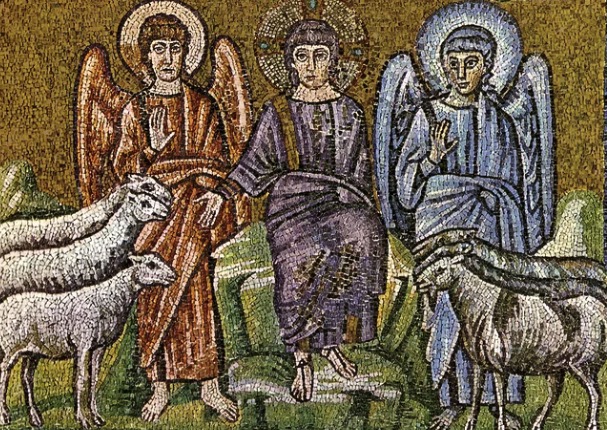
Fr. Kieran
O’Mahony
OSA
Fr. Francis
Martin
Fr. Francis Martin
34th Sunday of Year A

Fr. Francis Martin +August 11, 2017, served as Professor and then Professor Emeritus of New Testament at the Dominican House of Studies in Washington, D.C. He also taught at the Gregorian University in Rome, the Ecole Biblique in Jerusalem, Catholic University in Washington, D.C., Franciscan University of Steubenville), and the John Paul II Institute for Studies on Marriage and Family in Washington, D.C.
Navarre Bible Commentary
Navarre Bible Commentary
34th Sunday of Year A


The Jerome Biblical Commentary
The New Jerome Biblical Commentary, and
The Navarre Bible,
Church History by Laux (TAN Books),
AND MORE










